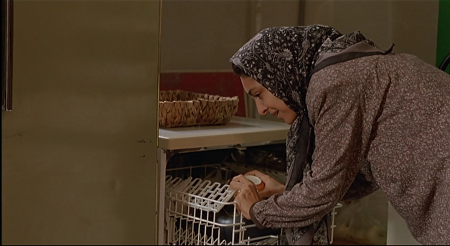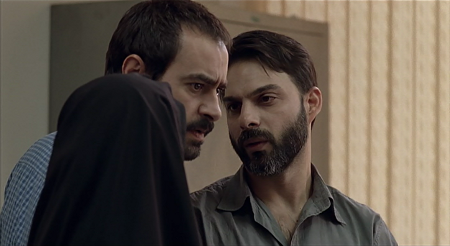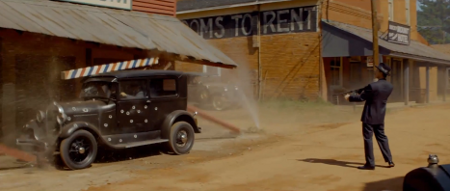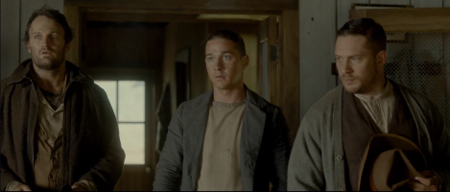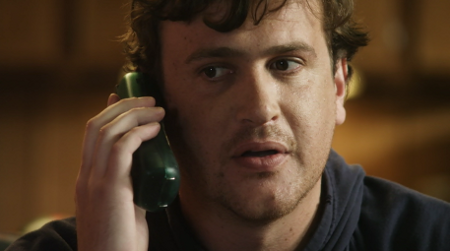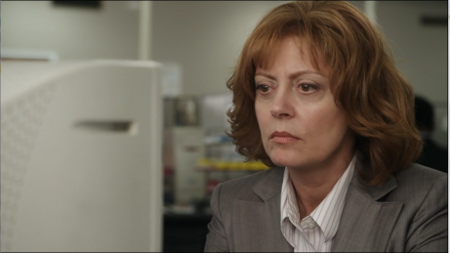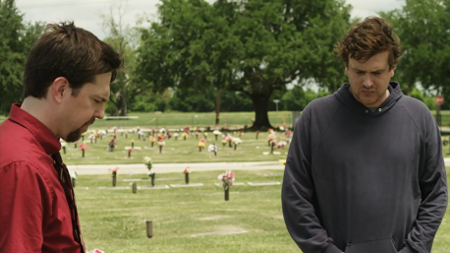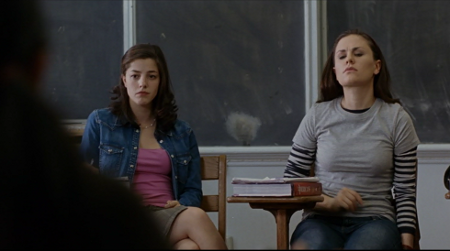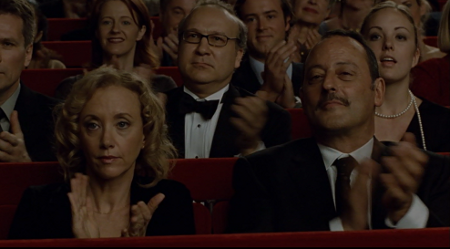A spaghetti western/revenge flick about slavery in the deep south should be a total disaster. It is just such a shocking concept that would require a deft hand, lots of planning, and a rock solid screenplay to even avoid being offensive, let alone succeed as a film.
Leave it to Quentin Tarantino to once again take old filmmaking styles and make them seem fresh, relevant, and sensitive to very dark material. Django Unchained somehow finds this intangible sense of humanity and heart in a very bloody revenge film. We care about characters who barely have two or three lines. The impetus of the story is a character more often seen screaming in pain than forming a sentence.
Django Unchained is the story of Dr. King Schultz, a German bounty hunter traveling throughout America for huge cash gains. He frees Django, a slave, because Django is the only person who can identify his newest bounty. In return for his assistance, Dr. Schultz agrees to help Django find and free his wife who was ripped away as punishment for a failed escape attempt.
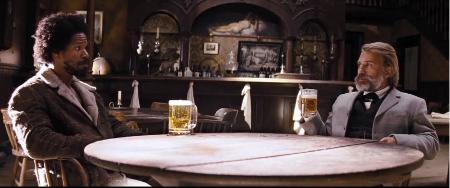
A mutual agreement to get revenge is formed
Forget anything you’ve heard about this really being a romance or being over the top schlock. It’s not. It’s hard to have a romance when half of the relationship is barely in the film. The same goes for the shock value. The biggest problem with the film is that the climax of the film is a huge blood bath that just goes on too long with no shift in the stakes.

No, Django Unchained is not really about freeing this woman.
This is how Django Unchained builds its tension. Quentin Tarantino bravely allows the film story to focus on revenge itself. This is not the softer narrative of Inglourious Basterds leading into a huge denouement of historical revisions and vengeance served. Everything that is shown happens to force the audience to want the revenge to happen. We are meant to be angered by how Django is treated in every scene to the point of wanting everyone who even looks at him funny to be destroyed.
Revenge dramas usually show you some shocking set piece at the beginning of the film and let you idly watch as the hero sets up his perfect scheme. Tarantino has subverted the form to force you to fall into this cycle of violence and revenge. There is no glorification here, no attempt to force you to cheer as the body starts flying. This revenge is empty and meaningless in the end for the audience because Django, as a character, is a non-entity.

No, the film is not about this particular plantation own, either.
That is the paradox of Django Unchained. If you blindly buy into the misdirection of the throughline and never question it, you might walk away shocked by what you saw. If you engage with the story and let the anger begin to flow through you as intended, you might walk away shocked by your own response to the film.
Rating: 9/10
Thoughts on Django Unchained? Sound off below.

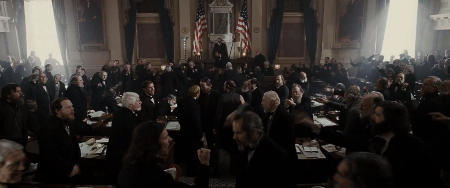
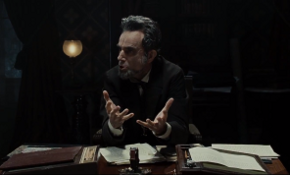
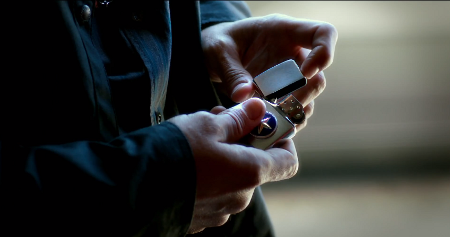
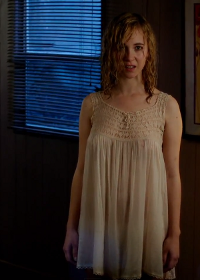


 Soderbergh adds a lot of style to the story that also helps to elevate it. Life is brightest inside the club, but most of the story takes place in the yellow, faded light of day. For so many of the characters, the club is their only source of joy or satisfaction. The real world lacks the same pizzazz and star quality even when the characters are acting like they’re having a good time. It’s a subtle device that really brings out a great sense of tension when the story takes a turn for the cliched.
Soderbergh adds a lot of style to the story that also helps to elevate it. Life is brightest inside the club, but most of the story takes place in the yellow, faded light of day. For so many of the characters, the club is their only source of joy or satisfaction. The real world lacks the same pizzazz and star quality even when the characters are acting like they’re having a good time. It’s a subtle device that really brings out a great sense of tension when the story takes a turn for the cliched.
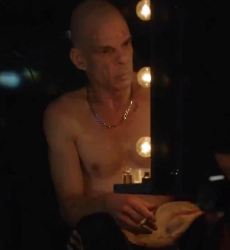 There’s something oddly satisfying about watching Monsieur Oscar adjust wigs, apply spirit gum, and remove prosthetics in between jobs. His character rips back the curtain on the effects-heavy nature of even a slice of life drama at this point.
There’s something oddly satisfying about watching Monsieur Oscar adjust wigs, apply spirit gum, and remove prosthetics in between jobs. His character rips back the curtain on the effects-heavy nature of even a slice of life drama at this point.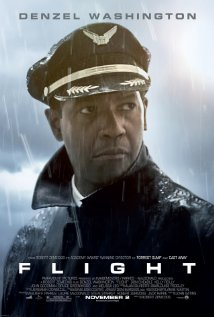 Unfortunately for that theory, there is a credited screenwriter for this pablum. John Gatins (Real Steel, The Shaggy Dog) literally has the cast circle the drain, danging onto poorly repeated metaphors and plot points for the middle hour of the film until anything interesting happens again. The entire “she loves him so she’ll save him” subplot could be cut with no impact on the structure of the story. It’s just another way to shovel in more addiction story cliches into a film that didn’t need them.
Unfortunately for that theory, there is a credited screenwriter for this pablum. John Gatins (Real Steel, The Shaggy Dog) literally has the cast circle the drain, danging onto poorly repeated metaphors and plot points for the middle hour of the film until anything interesting happens again. The entire “she loves him so she’ll save him” subplot could be cut with no impact on the structure of the story. It’s just another way to shovel in more addiction story cliches into a film that didn’t need them.
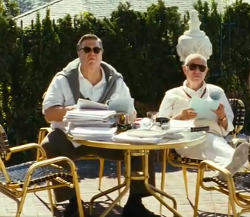 All of the best scenes are saved for Mendez and the Hollywood contacts. John Goodman (Chambers) and Alan Arkin (Siegel) are excellent as the unexpected CIA operatives. They voice all the doubts the audience could have in believable ways and tackle the project with humor and bravado. This trio of characters are the best developed and most authentic in the film.
All of the best scenes are saved for Mendez and the Hollywood contacts. John Goodman (Chambers) and Alan Arkin (Siegel) are excellent as the unexpected CIA operatives. They voice all the doubts the audience could have in believable ways and tackle the project with humor and bravado. This trio of characters are the best developed and most authentic in the film.